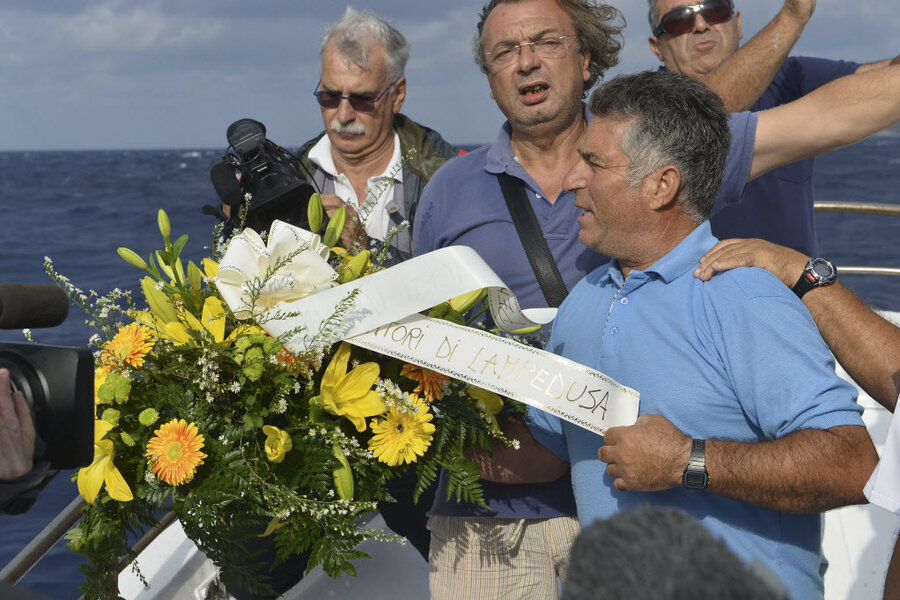Italian fishermen honor migrants lost at sea
Loading...
| Lampedusa, Italy
A flotilla of Italian fishermen motored into rough seas off Lampedusa on Saturday to drop a bouquet of yellow flowers near the spot of a shipwreck where more than 100 African migrants drowned. Some of them bristled at reports that a boat may have violated the "law of the sea" and ignored migrants fighting for their lives.
The search to recover more bodies, meanwhile, was called off for a second day because of the bad weather conditions. More than 200 migrants, possibly as many as 250, may still be missing.
The 65-foot migrant boat sank Thursday after a fire was set onboard to attract attention of any passing boats or people on shore. So far, 111 bodies have been recovered and 155 survivors have been accounted for.
About 10 fishing vessels headed out to the site of the shipwreck in choppy seas to drop the flowers and blast their horns in honor of the migrants who died.
Reports that a boat didn't help the stranded migrants prompted a Dutch lawmaker to call for an investigation. While survivors have told authorities that a boat passed, there has been no single boat identified nor have prosecutors launched a formal investigation.
Italian lawmaker Pia Locatelli, who visited the survivors Saturday, told The Associated Press the migrants reported that a boat circled them with a light and then went away. They also saw one or two more boats in the distance before the fire.
"They were absolutely sure in telling the boat went around their own boat," Locatelli said, adding that they said the boat had lights but they were unable to offer a further description.
Interpretations of an Italian law aimed at curbing illegal migration dissuade boat captains from helping migrants in distress, legislators have said.
"To come to rescue is a duty. Not to come to rescue is a crime," Laura Boldrini, the Italian house speaker who previously and for many years was the U.N. Refugee Agency spokeswoman in Italy told reporters in Lampedusa after visiting the survivors.
She said it was a misinterpretation of the law to conclude that offering aid to people in need on the open sea could in any way result in criminal charges. In addition, Boldrini said the phenomenon needs to be tackled in the countries of origin — and not with punitive measures against those fleeing misery and violence.
She cited an Italian law that makes entering Italy a crime. In keeping with the law, a prosecutor in Sicily has confirmed he is preparing paperwork against the migrants— a procedure hampered by their poor Italian and lack of documents.
"We won't ever solve the problem with repressive measures," Boldrini said. "It is unthinkable that someone who flees wars or death will stop in front of the hypothesis of a crime."
She said she spoke to one 27-year-old who had been forced to serve in the Eritrean military for eight years.
"They said how much they paid, how families indebted themselves, how they flee to find a life to find a life of peace and security, and also to pay back their families," Boldrini said.
At the refugee center, Awet, an Eritrean survivor who lost a friend in a shipwreck, told the AP he paid $1,600 to smugglers for the trip. He claimed the captain had a phone, but had thrown it into the sea.
Fishermen, including one who saved several dozen of the migrants from the shipwreck, said offering help to those in need is part of their code.
"It's the law of the sea!" Vito Fiorini said. "If you find somebody in need you must immediately help. How could you turn away when you see a person who needs help?
"They do it (help) all the time, it's unthinkable that a fisherman of Lampedusa would pretend to see nothing!"
Fiorini, who has said he was the first to reach the fiery wreck and sounded the alarm, said some of the 47 migrants he pulled from the sea had been stripped of their clothing, possibly by the current. Some clung onto water bottles to stay afloat for three hours and others were so slippery from being covered in gasoline that it was hard to pull them onboard.
The scope of the tragedy at Lampedusa — with 111 bodies recovered so far and more than 200 missing, according to survivor accounts given to U.N. officials — has prompted outpourings of grief and calls for a comprehensive EU immigration policy to deal with the tens of thousands fleeing poverty and strife in Africa and the Middle East.
Thousands make the perilous crossing each year, seeking a new life in the prosperous European Union. Smugglers charge thousands of dollars a head for the journey aboard overcrowded, barely seaworthy boats that lack life vests. Each year hundreds die undertaking the crossing.
AP writer Colleen Barry in Milan contributed to this report.





